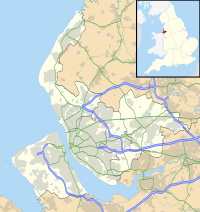Church of St James the Great, Haydock
| Church of St James the Great, Haydock | |
|---|---|
 | |
| 53°28′04″N 2°39′34″W / 53.4678°N 2.6595°W | |
| OS grid reference | SJ 564,970 |
| Location | Church Road, Haydock, Metropolitan Borough of St. Helens, Merseyside |
| Country | England |
| Denomination | Anglican |
| Churchmanship | Traditional Catholic |
| History | |
| Status | Parish church |
| Founded | 1866 |
| Dedication | St James the Great |
| Consecrated | 11 December 1866 |
| Architecture | |
| Functional status | Active |
| Architect(s) | W. and J. Hay Douglas and Fordham |
| Architectural type | Church |
| Specifications | |
| Materials | Brick, Timber framing with brick nogging |
| Administration | |
| Province | York |
| Diocese | Liverpool |
| Archdeaconry | Warrington |
| Deanery | Winwick |
| Parish | St James the Great, Haydock |
| Clergy | |
| Vicar(s) | Fr. Rodney Middleton |
| Honorary priest(s) | Fr. Robin Pettitt |
| Curate(s) | Fr. Ian Wynne (NSM) |
| Laity | |
| Reader(s) | Dr. David Martlew |
| Churchwarden(s) | Philip Peplow, Nancy Holloway |
The Church of St James the Great is in Church Road in the former mining community of Haydock, now part of the Metropolitan Borough of St. Helens, Merseyside, in the North-west of England (postcode WA11 0NJ). It is an active Anglican parish church in the diocese of Liverpool, the archdeaconry of Warrington and the deanery of Winwick.[1]
History
The original church was designed by W. and J. Hay[2] and consecrated on 11 December 1866. By 1888 this had become too small for the growing population, and in 1889 plans were approved for an extension. The foundation stone for this was laid on 5 October 1889, the new church was opened on 25 July 1891, and it was consecrated in June 1892. The old church became the Lady chapel of the new church.[3] The new church was designed by [Douglas and Fordham]].[2] In 1929–31 due to structural problems, the chancel, sanctuary and west wall were rebuilt and the spire was removed. Between 1988 and 1990 the church was reordered, providing a new chapel, St Alban's chapel.[3]
Architecture and fittings
The original church was small and built of brick. It now forms the Lady chapel of the church. The new church is timber framed with brick nogging on a sandstone plinth. This style was chosen because its flexibility would give protection against possible mining subsidence. The east end was originally timber framed but this was rebuilt in brick and render in 1929–31. The interior of the church contains much dark-stained oak. The hanging rood dated 1952 was designed by Edward Hines of the Warham Guild and carved by Jethro Harris. In the Lady Chapel is a triptych dated 1999 made from icons from the monastery of Barsana in Romania.[2] The organ was moved from St Mary's Church, Nantwich and rebuilt in St James by Harrison & Harrison in 1987–88.[4]
External features
The churchyard contains the war graves of eight soldiers of World War I.[5]
Activities
The church is in the high church tradition of the Church of England[3] and runs services on Sundays and some weekdays,[6] arranges baptisms, weddings and funerals[7] and runs a number of parish groups.[8]
See also
References
- ^ Deanery of Winwick, Diocese of Liverpool, retrieved 14 April 2009
- ^ a b c Pollard, Richard; Pevsner, Nikolaus (2006), Lancashire: Liverpool and the South-West, The Buildings of England, New Haven and London: Yale University Press, pp. 195–196, ISBN 0-300-10910-5
- ^ a b c About us, St James the Great, Haydock, retrieved 21 March 2008
- ^ Haydock St. James the Great, British Institute of Organ Studies, retrieved 14 April 2009
- ^ HAYDOCK (ST. JAMES THE GREAT) CHURCHYARD, Commonwealth War Graves Commission, retrieved 4 February 2013
- ^ Welcome, St James the Great, Haydock, retrieved 21 March 2008
- ^ Baptisms, weddings and funerals, St James the Great, Haydock, retrieved 21 March 2008
- ^ Parish groups, St James the Great, Haydock, retrieved 21 March 2008
Further reading
- Hubbard, Edward (1991), The Work of John Douglas, London: The Victorian Society, pp. 181–182, ISBN 0-901657-16-6

